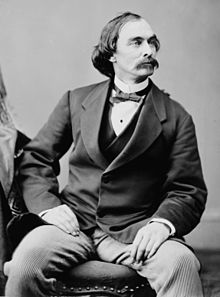Isaac Israel Hayes
Isaac Israel Hayes | |
|---|---|
 Isaac I. Hayes portrait by Mathew B. Brady, circa 1860-1875 | |
| Born | March 5, 1832 |
| Died | December 17, 1881 (aged 49) |
| Nationality | USA |
| Occupation(s) | Explorer, Physician |
Isaac Israel Hayes (March 5, 1832 – December 17, 1881) was an Arctic explorer, physician and politician.
Life
Hayes was born in Chester County, Pennsylvania. After completing his medical studies at the University of Pennsylvania, Hayes signed on as ship's surgeon for an 1853-5 expedition led by Elisha Kent Kane to search for John Franklin. His 1854 exploration of the east coast of Ellesmere Island north of 79° North resulted in new and accurately mapped geographical discoveries. Hayes was apparently the first non-aboriginal explorer of Ellesmere.
Hayes led his own expedition 1860-1 which claimed to have reached the farthest north land ever, on the Ellesmere Island coast at 81°35' North, 70°30' West. It was later found that this position is deep within Ellesmere, not on the coast, and that Hayes's resulting map of Ellesmere north of 80° North was erroneous, possibly because he had represented seriously non-noon sextant observations of the Sun as having been taken at noon, but more likely due to his having deliberately inverted the 2nd digit in his report of his farthest's lone lower limb sextant double altitude of the sun, to read 56°52′ instead of the true observation 59°52′. It is hard to explain how else he could have produced a latitude too high by one and a half degrees in tandem with an exactly correct longitude.
Hayes's 1861 farthest was at Cape Collinson, less than 10 miles north of 80° north, longitude 70°30′ west.
Hayes returned to the United States in 1861 claiming also to have seen the fictional Open Polar Sea reported by Elisha Kent Kane in 1855. The Civil War, however, had come to preoccupy Americans and diminished public interest in Hayes' reports of discovery. Hayes's expedition was memorialized in Frederic Edwin Church's painting Aurora Borealis, completed in 1865.
During the American Civil War, Hayes commanded Satterlee Hospital, a sprawling Union army 4,500-bed hospital in Philadelphia.
Hayes was a Republican member of the New York State Assembly (New York Co., 7th D.) in 1876, 1877, 1878, 1879, 1880 and 1881.
The United States Range on Canada's Ellesmere Island is named after his ship.
Ostrov Kheysa, an island in Franz Josef Land (Russia) is named after Isaac I. Hayes.
Further reading
- Robert E. Johnson, HAYES, ISAAC ISRAEL in Dictionary of Canadian Biography, vol. 11, University of Toronto/Université Laval, 2003–, accessed February 16, 2015, http://www.biographi.ca/en/bio/hayes_isaac_israel_11E.html.
- Michael Robinson, The Coldest Crucible: Arctic Exploration and American Culture (University of Chicago Press, 2006)
- Douglas W. Wamsley, Polar Hayes: The Life and Contributions of Isaac Israel Hayes, M.D, (American Philosophical Society Press, 2009) ISBN 0-87169-262-7
External links
- Works by Isaac Israel Hayes at Project Gutenberg
- Works by or about Isaac Israel Hayes at the Internet Archive
- Biography at the Dictionary of Canadian Biography Online
- Hayes Biography
- Hayes' 1860-1 backers, data, alterations, maps, picture of farthest
- The Open Polar Sea by I. I. Hayes (Internet Archive)
